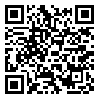1. Zahed A, Ghalilo K, Abolghasemi A, Narimani M. The relationship between emotion regulation strategies and interpersonal behavior among substance abusers. Journal of Research on Addiction 2009; 3(11):99–114. [
Article]
2. Gross JJ. Handbook of emotion regulation. 2nd ed. New York City, United States: Guilford Press; 2015. [
Book]
3. Vanderhasselt MA, Koster EH, Onraedt T, Bruyneel L, Goubert L, De Raedt R. Adaptive cognitive emotion regulation moderates the relationship between dysfunctional attitudes and depressive symptoms during a stressful life period: a prospective study. J Behav Ther Exp Psychiatry 2014; 45(2):291–6. [
PubMed]
4. Garnefski N, Van Den Kommer T, Kraaij V, Teerds J, Legerstee J, Onstein E. The relationship between cognitive emotion regulation strategies and emotional problems: comparison between a clinical and a non-clinical sample. Eur J Pers 2002; 16(5):403-20. [
Article]
5. Trinidad DR, Johnson CA. The association between emotional intelligence and early adolescent tobacco and alcohol use. Pers Individ Dif 2002; 32(1):95-105. [
Article] [
DOI]
6. Clark L. SOS help for emotions: managing anxiety, anger and depression. 2nd ed. United States America: SOS Programs & Parents Press; 2008.
7. Gross JJ, John OP. Individual differences in two emotion regulation processes: implications for affect, relationships, and well-being. J Peres Soc Psychol 2003; 85(2):348–62. [
PubMed]
8. Gross JJ, Thompson RA. Emotion regulation: conceptual foundations. 2nd ed. New York City, United States: Guilford Press; 2007. P.3–26. [
Article]
9. Nyklíček I, Vingerhoets A, Zeelenberg M. Emotion regulation and well-being. 1st ed. Berlin/Heidelberg, Germany: Springer Science & Business Media; 2010. [
Book]
10. Clarck PB. The relationship between wellness, emotion regulation, and relapse in adult outpatient substance abuse clients [PhD thesis]. Greensboro, North Carolina, United States: University of North Carolina at Greensboro; 2012. [
Thesis]
11. Schwarzer R. Self-efficacy: thought control of action. 1st ed. Abingdon-on-Thames, United Kingdom: Routledge, Taylor & Francis; 2015. [
Book]
12. Abdollahi Z, Taghizadeh F, Hamzehgardeshi Z, Bahramzad O. Relationship between addiction relapse and self-efficacy rates in injection drug users referred to Maintenance Therapy Center of Sari, 1391. Glob J Health Sci 2014; 6(3):138-44. [
DOI] [
PubMed]
13. Ibrahim F, Kumar N, Samah BA. Self efficacy and relapsed addiction tendency: an empirical study. The Social Sciences 2011; 6(4):277-82. [
Article] [
DOI]
14. Ryff CD, Singer BH. Know thyself and become what you are: a eudaimonic approach to psychological well-being. J Happiness Stud 2008; 9 (1):13-39. [
Article] [
DOI]
15. Sun HM, Li XY, Chow EP, Li T, Xian Y, Lu YH, et al. Methadone maintenance treatment programme reduces criminal activity and improves social well-being of drug users in China: a systematic review and meta-analysis. BMJ Open 2015; 5(1):e005997. [
DOI] [
PubMed]
16. Seligman MEP. Flourish: A visionary new understanding of happiness and well-being. 1st ed. New York City, United States: Atria, Simon and Schuster; 2012. [
Book]
17. Gross JJ, Thompson RA. Emotion regulation: Conceptual foundations. 1st ed. New York City, United States: Guilford Press; 2007. P.3-24.
18. Aldao A, Nolen-Hoeksema S, Schweizer S. Emotion-regulation strategies across psychopathology: a meta-analytic review. Clin Psychol Rev 2010; 30(2):217-37. [
DOI] [
PubMed]
19. Gross JJ, John OP. Individual differences in two emotion regulation processes: Implications for affect, relationships, and well-being. J Pers Soc Psychol 2003; 85(2):348-62. [
PubMed]
20. Hosseini FS, khayyer M. Investigation of the role of teacher in mathematic academic emotions and students emotion regulation. Modern Psychological Research 2010; 5(20):41-63.
21. Ryff CD, Keyes CL. The structure of psychological well-being revisited. J Pers Soc Psychol 1995; 69(4):719-27. [
PubMed]
22. Sherer M, Maddux JE, Mercandante B, Prentice-Dunn S, Jacobs B, Rogers RW. The Self - Efficacy Scale: construction and Validation. Psychol Rep 1982; 51(2):663-71.
23. Barati Bakhtiari S. Studying simple and multiple of self efficacy, self esteem and self care with educational function in the students [MSc thesis]. Ahvaz, Iran: Shahid Chamran University of Ahvaz; 1997.
24. Ertan Yoruk C, Yoruk BK. The impact of drinking on psychological well-being: evidence from minimum drinking age laws in the United States. Soc Sci Med 2012; 75(10):1844-54. [
DOI] [
PubMed]
25. Habil MH, Abd Rashid R, Sulaiman AH, Peters H, Ahmad Zahari MM, Amer Nordin AS, et al. Substance abuse and violence behavior. International Journal of Addiction Sciences 2010; 1(1):1-5.
26. Bandura A, Locke EA. Negative self-efficacy and goal effects revisited. J Appl Psychol 2003; 88(1):87-99. [
PubMed]
27. Yen CF, Wu HY, Yen JY, Ko CH. Effects of brief cognitive-behavioral interventions on confidence to resist the urges to use heroin and methamphetamine in relapse-related situations. J Nerv Ment Dis 2004; 192(11):788-91. [
PubMed]
28. Moos RH, Moos BS. Rates and predictors of relapse after natural and treated remission from alcohol use disorders. Addiction 2006; 101(2):212-22. [
PubMed]
29. Choi HJ, Krieger JL, Hecht ML. Reconceptualizing efficacy in substance use prevention research: refusal response efficacy and drug resistance self-efficacy in adolescent substance use. Health Commun 2013; 28(1):40-52. [
PubMed]
30. McKay MT, Sumnall HR, Cole JC, Percy A. Self-esteem and self-efficacy: Associations with alcohol consumption in a sample of adolescents in Northern Ireland. Drugs 2012; 19(1):72-80. [
Article]








